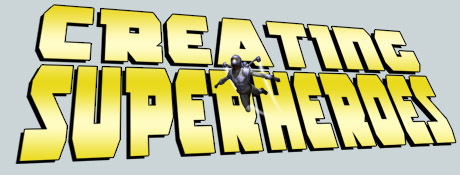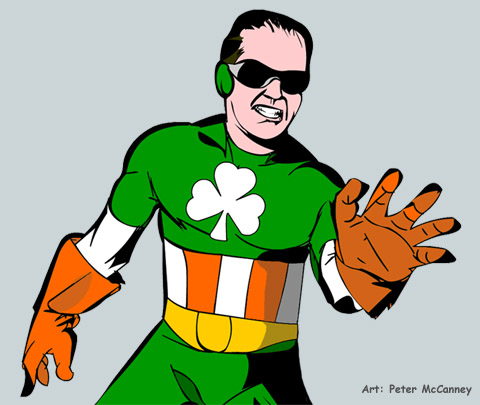
I receive a lot of mail from readers asking all sorts of questions about the New Heroes series (such as "What happens in the next book?" - yeah, right! Like I'm going to tell anyone that!). Among the most common questions are those concerning the creation of superheroes (and supervillains, of course). So I've decided that it might be fun and educational (just in case any teachers or parents are reading) to detail a little of the creation process.
So over the course of the next quiteawhile*, I'll be adding more and more to this section. And for an added bonus, every so often you'll find some handy tips, stuff I've discovered the hard way. That's the first rule of writing: learn from experience. And if that experience just happens to be someone else's, then that's even better!
There's no doubt in my mind that the hardest part of creating a superhero character is... The name. All the good names have been taken!
Do you have any idea how long I spent trying to find names for the characters that were to become Titan and Paragon? No, you don't, because I haven't told you yet. Well, I'll tell you now. It took ages, that's how long!
I should point out that - unlike some writers - when I'm in the middle of a book I don't stop for anything, especially not for something like coming up with a good name for a character. I just bung in the first name I think of and keep going. But once the majority of the work was done on the first draft of The Quantum Prophecy (even though the book itself wasn't called that then), I started to check out the names I'd used. I've got thousands of comics and about twenty big chunky comic reference books, plus I've got an internet somewhere inside my computer.
Titan was originally called Megaman. I discovered rather quickly that there's a musician called Megaman, and there was also a video game character of that name. So. Megaman was out. What to call him...? After much trawling through my reference books, I came up with absolutely nothing. It was time to crack open the thesaurus. Looking up synonyms for strength, I discovered the word "Titan".
"Nah," I thought. "Can't use that one. That's bound to have been used before." But I checked anyway... There was the Teen Titans, of course, and in the 1970s one of Marvel UK's reprint titles was called The Titans, but... I couldn't find any single character with that name. Result!
Ragnarök was going to be called Doctor Apocalypse. I was pretty pleased with that one, especially since I couldn't find any other Doctor Apocalypses anywhere. The name stuck for a long time, until I happened to re-read Alan Moore's classic Mystery Incorporated (from the 1963 series), in which one character makes a mention of "Doc Apocalypse". Darn it all to heck! Back to the researching-board!
It took a long time, but eventually I came up with Ragnarök, which in Norse mythology is the ultimate battle between the gods and the forces of evil. Given the book's prologue, it was a rather appropriate name, I thought!
Paragon was the hardest character to name. I wanted something that sounded dangerous and mysterious, so he was originally called Darkness, but that never seemed quite right. In one of the early drafts he was even called Captain Darkness, but that one was just too silly. I hit on the name Paragon almost by accident, when I was searching for a good name for an extremely powerful character who was soon deleted from the book (for various reasons that I won't go into here). I decided that the name was too good to waste.
The name I was most proud of was Toxin, the poisonous-acid-dripping supervillain. Like Titan, it was one that I couldn't believe had never been used before. And then, a couple of days before the proof pages were due to go back to my editor, a friend pointed out that Marvel had just announced a new character of the same name. Double-darn!
A search for good words meaning "poison" or "venom" (both of which had, of course, already been taken), lead me absolutely nowhere, so I walked around to the far side of the desk and reached for the Encyclopaedia Britannica. After a couple of hours of reading all about poisons (and scaring the pants off myself in the process), I happened upon one of the most scary of all: a heterocyclic hydrocarbon known as 2,3,7,8-tetrachlorodibenzo-p-dioxin (2,3,7,8-TCDD). Commonly called Dioxin.

What sets superheroes apart from ordinary heroes is - usually - some sort of super-power. I say "usually" because not all superheroes have supernatural abilities. Batman, for example, relies on his gadgets and his skills, as do Hawkeye and Iron Man ("in a bizarre accident, billionaire Tony Stark was ironing a radioactive shirt when the phone rang..."), and indeed even my own character Paragon has no superhuman abilities.
But let's ignore those guys for the moment and concentrate on creating characters who do have powers...
I think it should go without saying that it's probably not a good idea to give one of your super-powered characters the "proportionate strength of a spider". That one's already been done.
In fact, the sad news is that all the cool animals and insects have already been exploited by the major comics companies. Even most of the non-cool ones have been taken.
Now, there are some creatures that haven't really been superheroised in comics, but let's face it: not many people would want to read about GerbilMan or Captain Rabbit. And LadybirdGirl...? "After accidentally being injected with a serum derived from a bunch of mashed-up ladybirds*, young Blodwyn Bloggs discovers that she can shrink to the size of a ladybird and can evade capture by making wee-wee in the bad-guys' hands." Hmm. I don't think so!
If you're writing a humorous superhero tale, then by all means feel free to go down the silly route. GerbilMan would be ideal in that situation, as would, say, MilkMan (the only superhero who has to get up at four o'clock every morning), or LifeBoy: "Blessed with an inhuman ability to never drown, LifeBoy keeps eternal watch over the bay, ready to very slowly float into action should any sailors get into difficulty anywhere in a radius of about eight metres" (unfortunately, that brilliant joke is only funny if you don't pronounce "buoy" as "boo-ey" like the Americans do).
For more serious stuff, you need to be aware of the major characters out there. Unless their powers are rather general, don't do what they've already done. You certainly don't want your heroes to be duplicates of someone else's. To be specific: don't create Excellentman, who comes from a long-destroyed distant planet and is incredibly strong, and can fly, see through walls and has Excellentbreath.
You should also be careful when creating a patriotic superhero in case he turns out to be a clone of Captain America or Captain Britain...

Yes, that's me in a photoshopped Captain Ireland costume, hailing from way, way back in time before I had more hair on my back then I do on my head!
And here's Captain Ireland again, this time drawn by an actual artist, the supremely talented Peter McCanney...

Anyway, here's a list of fairly standard superpowers that are pretty much OK to use, but try to mix them up a little:
Whatever powers you decide to give your characters, it's important to remember that they should still be ordinary people in every other way. In the New Heroes universe, the most powerful character is... Ah. Well, that would be telling! But this person has certain aspects that (I hope) help to identify him (or her) with the non-super-powered reader.
To me, this is one of the most important things about writing fiction: I learned it from the works of the world's greatest science fiction writer, Harry Harrison... Harry almost never uses aliens in his SF novels, because good science fiction isn't about science, it's about how science affects people.
The same is true for superheroes: it's not the "super" that's important, it's the "heroes".

* "Quiteawhile" - not a real word, so don't go using it in your homework and then blaming me when the teacher gives you hell!
* "Ladybird" - that's "Ladybug" to the Americans!